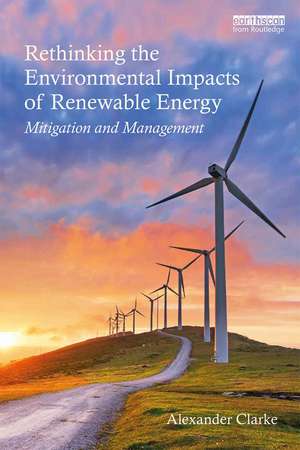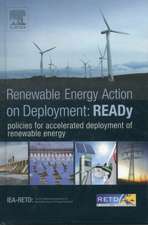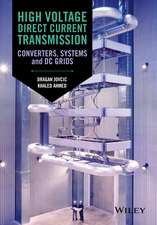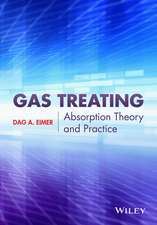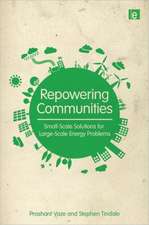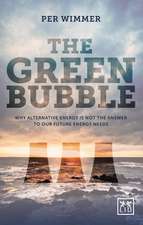Rethinking the Environmental Impacts of Renewable Energy: Mitigation and management
Autor Alexander Clarkeen Limba Engleză Paperback – 23 aug 2016
This book analyses the nature of environmental impacts from renewable sources. A novel method of assessing impacts is explored based on a set of parameters centred on how diffuse or concentrated the energy flow is. The approach that is developed will inform engineers, designers, policy makers and planners as well as researchers in the area.
| Toate formatele și edițiile | Preț | Express |
|---|---|---|
| Paperback (1) | 369.42 lei 6-8 săpt. | |
| Taylor & Francis – 23 aug 2016 | 369.42 lei 6-8 săpt. | |
| Hardback (1) | 818.28 lei 6-8 săpt. | |
| Taylor & Francis – 29 aug 2016 | 818.28 lei 6-8 săpt. |
Preț: 369.42 lei
Preț vechi: 484.33 lei
-24% Nou
Puncte Express: 554
Preț estimativ în valută:
70.69€ • 73.99$ • 58.84£
70.69€ • 73.99$ • 58.84£
Carte tipărită la comandă
Livrare economică 31 martie-14 aprilie
Preluare comenzi: 021 569.72.76
Specificații
ISBN-13: 9780415722186
ISBN-10: 0415722187
Pagini: 288
Ilustrații: 144
Dimensiuni: 156 x 234 x 26 mm
Greutate: 0.41 kg
Ediția:1
Editura: Taylor & Francis
Colecția Routledge
Locul publicării:Oxford, United Kingdom
ISBN-10: 0415722187
Pagini: 288
Ilustrații: 144
Dimensiuni: 156 x 234 x 26 mm
Greutate: 0.41 kg
Ediția:1
Editura: Taylor & Francis
Colecția Routledge
Locul publicării:Oxford, United Kingdom
Public țintă
Professional Practice & DevelopmentCuprins
1. Introduction 2. Literature Survey 3. Theory 4. Questions raised by the theory 5. Setting up the test 6. Initial results and first conclusions 7. Extension of the hypothesis to other water based renewable sources 8. Extension of the hypothesis to low power flux density sources 9. Conclusions
Recenzii
"In terms of possible responses to the impacts Clarke’s book describes, it allows us to go beyond simple practical rules of thumb, like that evidently used sometimes by run-of-the-river hydro project designers who say you should not take out more than 10% of the energy in the flow...It is helpful to have a rigorous basis for counter-assertions and a guide for making low impact choices. There are impacts, but mostly they are small and, with the help of studies like this, most can hopefully be dealt with. Recommended." - Dave Elliott, ENVIRONMENTALRESEARCHWEB
Descriere
Renewable energy is important as a substitute for finite fossil fuels and inflexible nuclear power and could conceivably power the world. However, this is challenging as the world is currently 80% dependent on fossil fuels, and renewable sources produce only about 15% of total energy. Conversion technologies for use with many of the eight different primary sources of renewable energy are only just emerging as viable technologies. While renewable energy sources will not run out, and their use involves little or no release of carbon dioxide or ionising wastes, they do have local environmental impacts of their own.
